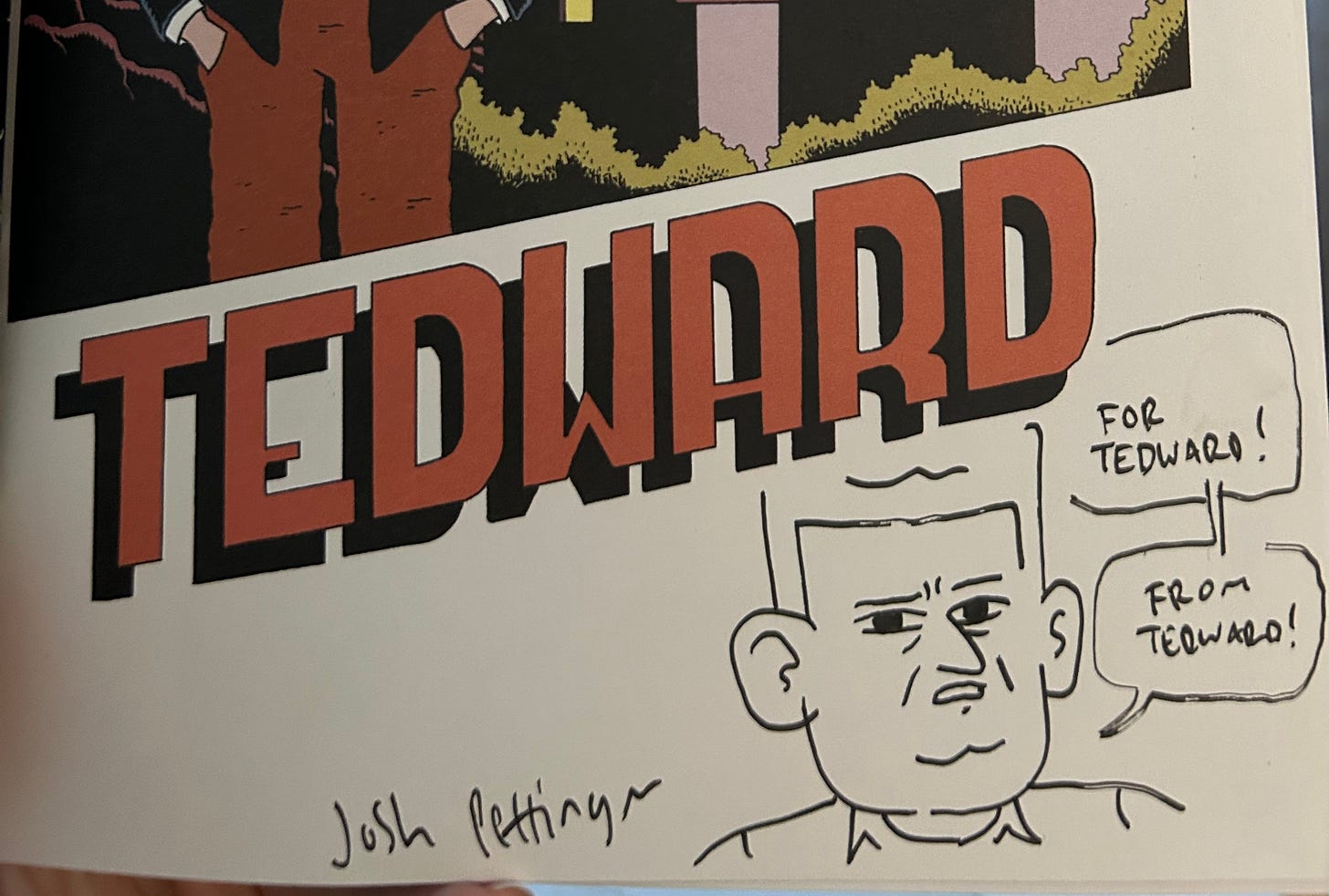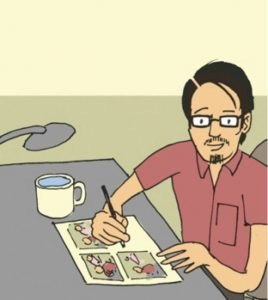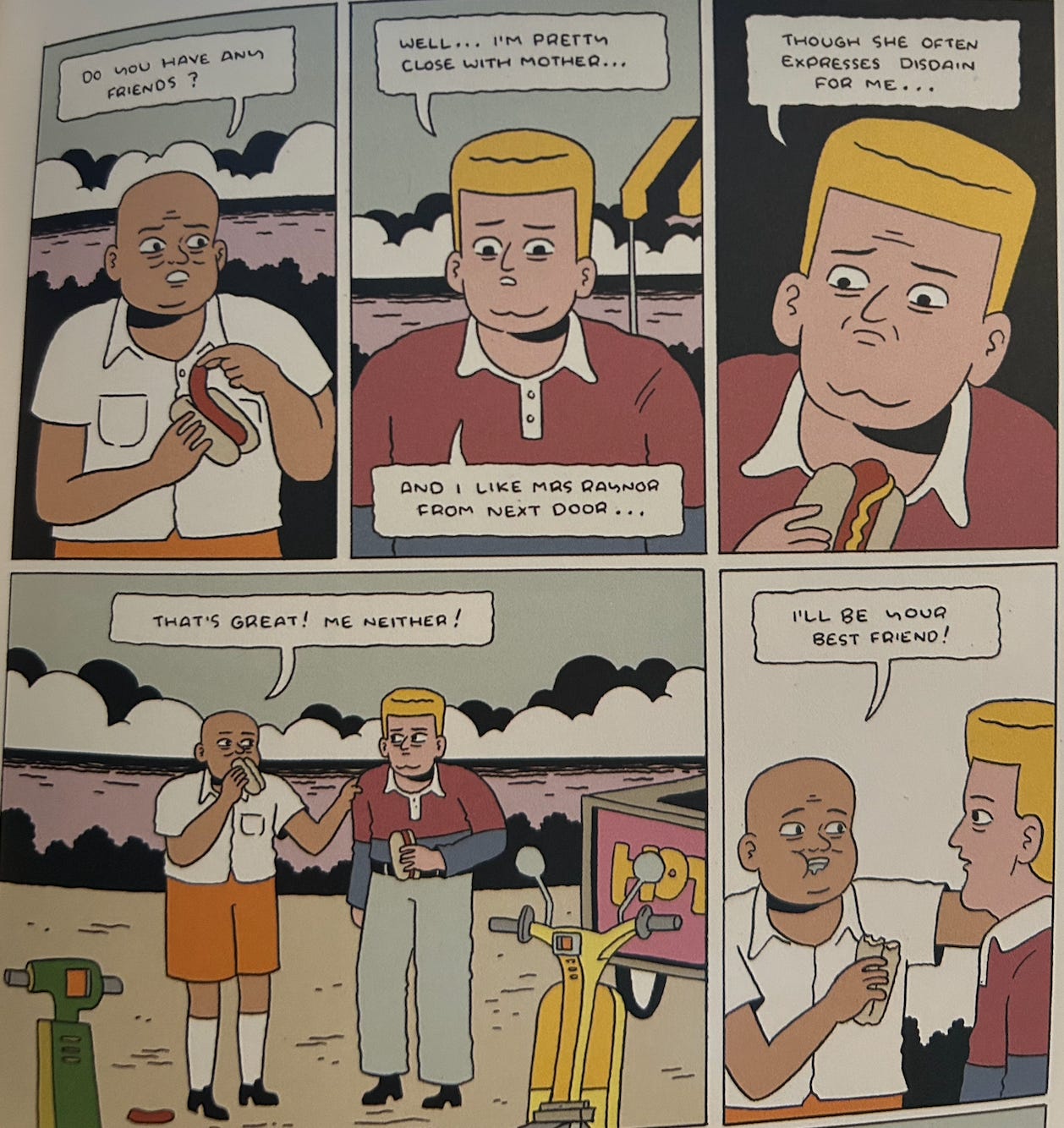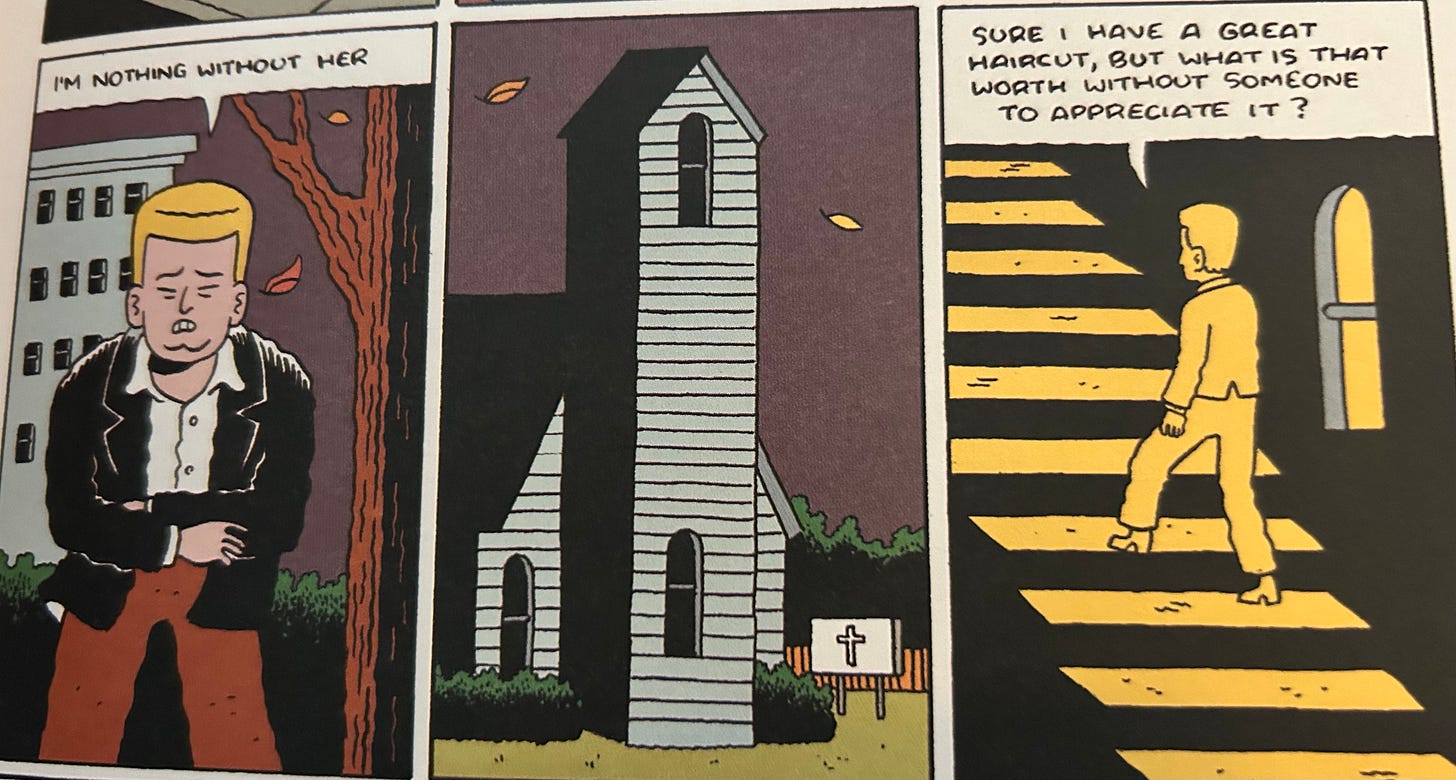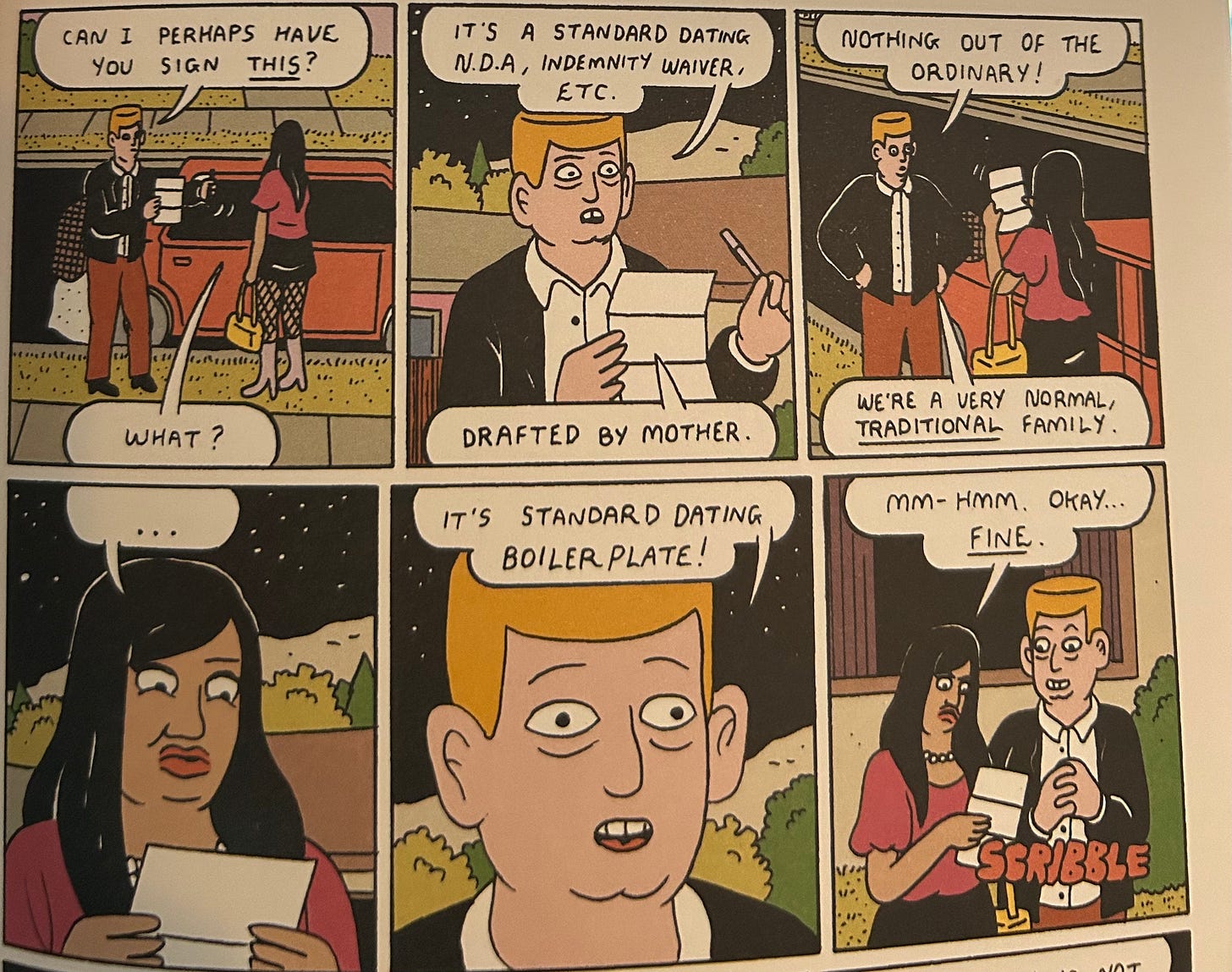TEDWARD - SerioComics 65 + Q&A with Author Josh Pettinger
Graphic Medicine spotlights SWBAG? + Monthly Gun Debate Update - April 2025
Graphic Medicine Spotlights SHOULD WE BUY A GUN?
GraphicMedicine.org was founded by Dr. Ian Williams who is a comics artist and also a physician.
He says his use of the phrase ‘graphic medicine’ is not just the comics medium meeting health discourse but because he believes comics has therapeutic potential.
It was exciting that Benjamin Schwartz offered to spotlight SHOULD WE BUY A GUN? for them.
Here’s some excerpts from his post!
Monthly Gun Debate Update - April 2025
The Bipartisan Mental Health Compromise on Guns, DeFunded?
Michael C. Bender reported for The New York Times that the Trump administration has canceled $1 billion in student mental health grants, originally authorized by the 2022 Bipartisan Safer Communities Act (BSCA).
This law, which broke years of Congressional gridlock, aimed to address one of the most agreed-upon aspects of the gun violence crisis: that early mental health intervention, especially in schools, can prevent tragedy.
The cancellation is being justified on the grounds that some grant recipients sought to train mental health workers to be more representative of the students they serve and to help professionals understand issues like racial trauma.
MAGA has weaponized this as so-called "race-based" discrimination.
How This Connects to Should We Buy A Gun?
As you saw in the spotlight from GraphicMedicine.org, one of the dual narratives in SWBAG? follows a teen in crisis, inspired by Uvalde as well, representing the kinds of young people school-based mental health services can reach before tragedy strikes.
I specifically included interventions like Behavioral Threat Assessments and Safe and Supportive School Teams, which build environments where mental health, emotional regulation, and community support can interrupt the cycles of alienation and violence that can lead to shootings or self-harm.
And these are the types of services from the BSCA grants now being revoked.
How To Depolarize?
The NY Times’ Bender quoted Senator Chris Murphy, one of the BSCA’s architects:
“I’m raw about this because I sat in the room for a long time negotiating a really delicate compromise on a really tough issue,” Mr. Murphy said in an interview. “What’s the point of being in Congress and writing laws if the president can just ignore them? So, I’m angry that my Republican partners are not out there raising objections to what the president is doing.”
Conservatives in the article claim that the grants can be refunded if “DEI” language is removed from the early intervention and care models.
Let’s hope that’s true…
For better or worse, as I described in my Henry Jenkins’ interview, I pursued a relatively race-free approach to the depiction of the counselor, Adam, and the student, David, even though David’s story line has visible diversity.
Henry Jenkins: Can you talk a bit about the character design in the book? What steps did you take to avoid reducing these characters to stereotypes and those characterizing their positions?
Dave Cowen: That’s a great question. And I’m not sure I succeeded! I think some character design things I tried to do was make exceptions to the stereotypes part of the rule of the character design. For instance, an elder Indian-American mentor editor at NPR is probably unlikely to own a gun as a stereotype, but, here she is. Or a queer interracial couple isn’t usually thought of as having strong Christian values, but, here they are. Which, if you live in Los Angeles like we do, you often find that there is tremendous diversity within diversity, so any of those examples aren’t that rare. I think the toughest character design was the teenage student, David. He was originally named John White and was a White person, because potential school shooters are statistically more likely to be young White men. However, later in the drafting process, I decided to change his race to a mix of Latino and White. His father was already absent in the narrative, but his mother stayed White. I also changed his name from John to David. Which is my given name. His last name changed to something Latino, in this case, Gomez. Why the change? Well, not to ruin the story, but this character has a redemption arc. So I didn’t want people to think that only a young White male could be redeemed in this way. I really wanted – and I think this change came after the shooting in Uvalde (which was by someone with Latino background) – people to identify this redemption arc with any young man. And the given name change to David promoted semi-autobiographical identification, which essentially says: reader, you or me or someone we love could become wayward.
Another difficult choice was, do I rewrite his dialogue, his characterization, his plot based on this change to his heritage? I talked to a friend who is of Latino background, and he advised that he thought it would be even better to not change any of it, besides the literal color of the character, because changing him to fit some stereotype of what I thought might be different would be paradoxically stereotypical itself.
What can Graphic Medicine do right now?
SWBAG? shows implicitly that mental health supports are not partisan.
They are a key component of any humane, community-based approach to public safety.
The rollback of BSCA funding is hopefully just a temporary loss.
But it also reinforces the need for independent, creative storytelling that can cut through the noise and highlight the lived experiences behind these policy debates.
For further reading
Trigger Points by Mark Follman
And, of course, Should We Buy A Gun?
TEDWARD - SerioComics 65
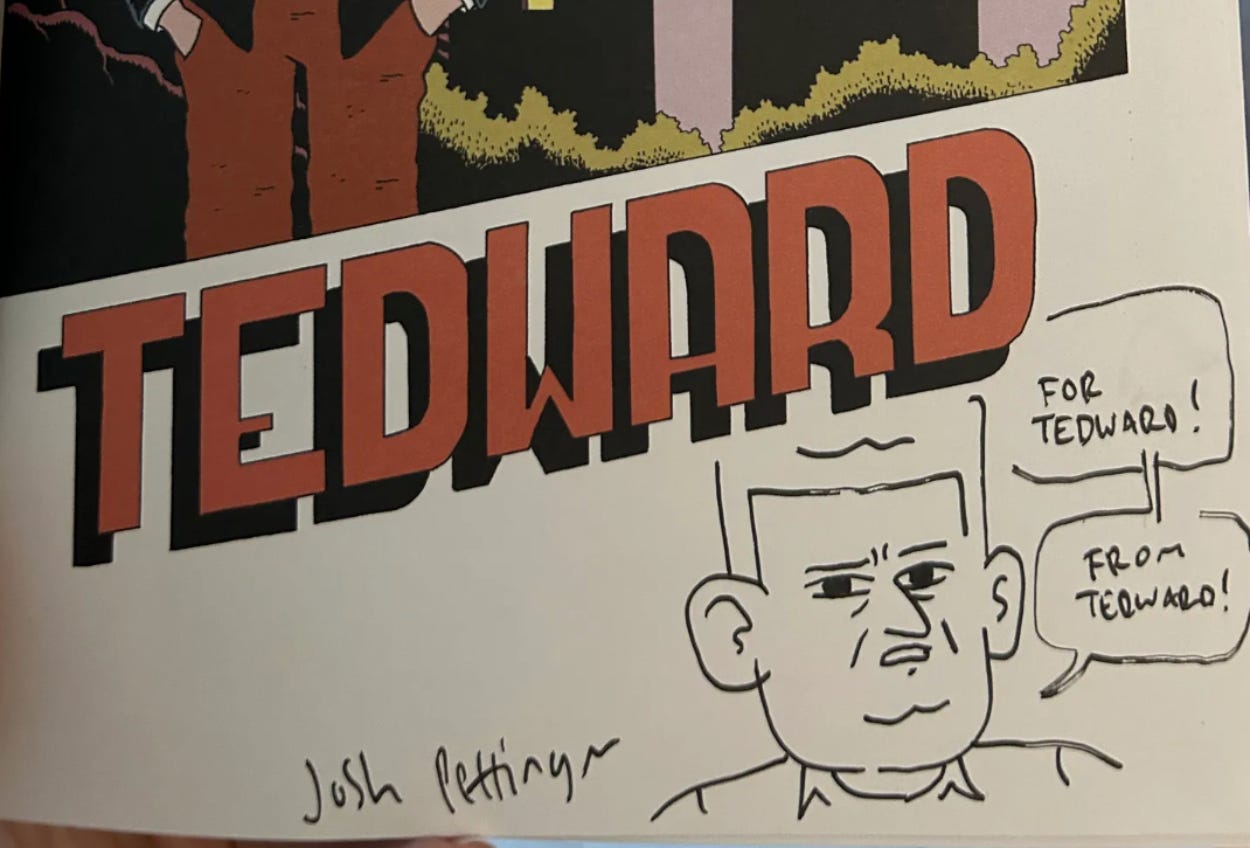
How I Met Josh Pettinger!
As part of my manic initiation into covering and making comics.
I took a flight to Seattle back in March with a press pass.
And attended the Emerald City Comic Convention.
There I happened to meet Josh Pettinger at his table.
I didn’t know anything about him then to be honest.
Which is kind of crazy.
But I liked the look of his book.
And was even more impressed by his laid back cool persona.
We talked bicycles.
He mentioned he was having an after party at Fantagraphics.
Which is based in Seattle :)
I said I was catching a flight back to LA that night.
He said he’d be in LA in April.
I asked if I could interview him for promo before then.
He said sure.
I didn’t buy his book from him then.
But I went to Fantagraphics.
Before the after party.
And bought his book from Larry.
Then gave Larry a copy of Should We Buy A Gun?
My DM to Josh with the questions didn’t send.
He wasn’t able to get the answers done in time.
But we met again though at that event in April.
By then I had read Tedward.
And was incredibly impressed by his humor and skill.
I was much less chill.
Much more Tedward.
But I leaned into my Tedwardness.
And approached him again for the answers to his Q&A.
And again.
And maybe another time…
I think he has enormous pathos for me.
Just like he does his character Tedward.
OK.
Here it is!
Josh Pettinger
Josh Pettinger is an English cartoonist based out of America. His long running comic book series Goiter has received some acclaim and has been translated into French.
Tedward is his latest collection. A spiritual cousin to the humor of Simon Hanselmann and Daniel Clowes, Pettinger’s singularity of tone and style in these episodic comedies mark him as a master cartoonist just entering his prime.
TEDWARD

Meet Tedward — a blockhead with a heart of gold, and a talent for making bad situations worse.
Tedward is, in many ways, the quintessential ‘lovable loser’ — an almost literal blockhead and mangenue in the grand tradition of Pee-Wee Herman, Candide, and Flakey Foont, affording his creator the perfect vehicle to indulge his brilliantly absurdist storytelling instincts.
Tedward’s susceptibility to temptation, exploitation (capitalistic or sexual), and misplaced trust continually lands him in ridiculous and hilarious situations, be they scatological, orgiastic, violent, or mundane.
His heart of gold never wavers through it all.
Josh Pettinger is the Will Ferrell/Jim Carrey/etcetera etcetera of Comics?
Comics are of course meant to be funny.
The word is comic after all.
And they were often called the funny pages.
It’s refreshing to see a comic that is just so absurdly funny.
In the way I remember loving and laughing at 90s and 2000s film comedies.
Like Dumb and Dumber by Jim Carrey.
Or Step Brothers by Will Ferrell.
Even more niche things like Delocated by Jon Glaser.
The list could go on endlessly...
It’s just updated for 2025 in beautiful handcrafted art.
Incredibly funny Yet still poignant
Even with the ruthless idiosyncratic hilarity.
The unrelenting messy anarchy.
There’s a touching pathos to Pettinger’s Tedward.
I think one of the reasons I loved this book so much.
Is it reminds me of the screenplays I used to write back in the 2000s and 2010s.
While I don’t write that way as much anymore.
I’ve been more focused on the educational side of myself.
I was overjoyed to see that being so funny, so weird, and so pathetic at the same time.
There’s still a place for that.
And Tedward truly is one of the best I’ve seen of it in the comics medium.
Guest Episode by Simon Hanselmann!
The Tedward book is full of episodes.
That are almost like TV shows.
Yet still come together into something in the end.
Along the way there is a chapter written by Pettinger’s friend Simon Hanselmann.
Who is known for a similar absurdist humor.
It’s fun to see the character in another talent’s hands.
The drawing is slightly different.
The joke pattern as well.
I wonder how much was written by Simon or both of them together???
Let’s see what he has to say about one of the funniest books of 2025!
Q&A with Josh Pettinger!

1. SerioComics: I wrote to you after I read Tedward that I both love and hate to admit I feel like Tedward. Do you also feel like Tedward sometimes?
Josh Pettinger: Unfortunately, I think so. Tedward is a person that life happens to, he isn't necessarily steering the ship, which I can sometimes relate to. At least I was definitely a lot more like Tedward in my twenties. Now I think I'm a lot less inhibited, or repressed and living inside of my own head.
2. SerioComics: The graphic novel is both episodic and narrative. Tell us about how you constructed that ingenious form?
Josh Pettinger: Well Tedward was originally just going to be the three page comic that appears in GOITER 8 but I revived him for the zine 'Power wash'. I believe the premise for that zine came before I decided it was a Tedward story. Anyway I inserted Tedward into that story and intended to move onto the next thing but something about that character nagged at me. Stories starting developing for him. So at a certain point it was just going to be a bunch of single, unconnected issues, but then the last chapter came to me and I realized I could make this into a single narrative. I pitched FANTAGRAPHICS and they agreed to put it out as a book. So basically the final form of Tedward came very together kind of naturally.
3. SerioComics: The dialogue is so specific and some of the funniest, most off-kilter style in comics today. Is your process for picking such exact and hilarious phrases painstaking or carefree?
Josh Pettinger: Actually the hardest part for me is plot. All dialogue is essentially just a second pass. I write the comic as I pencil and rewrite it as I Ink. The dialogue is probably what comes easiest to me. Perhaps I should agonize over it a little more but I find the most natural and usually funniest lines are the first that come to me. I try to just trust my instinct, in that if something makes me laugh, others will probably find it funny. Other parts of the comics get written and rewritten and rewritten though.
4. SerioComics: Simon Hanselmann guest writes one of the episodes. What is it like drawing his version of your character?
Josh Pettinger: He actually drew that one too. That's all him, from the zine TEDWARD CLASSIC MOVIES. I love that story!
5. SerioComics: Who are your influences and who should we also be reading if we love your work? And what can we enjoy from your back catalogue and what should we expect from you next?
Josh Pettinger: My influences are a lot of EC comics, 90s Fantagraphics stuff, Raymond Briggs, alternative Japanese comics. Right now I'm really into Hanakuma. Free cockmen! I wouldn't want to denigrate anybody by saying that their work is similar to mine, but the people who's work I love the most right now are Nathan Cowdry, Hanselmann, Alex Graham, Roman Muradov, Noah Van Sciver, Olivier Schrauwen, Nick Maandag. And what to expect next? PLEASURE BEACH! I just put out the first 40 pages of my next book which is called Pleasure Beach. It's about A model, returning home to a derelict seaside town. It's about going home, kind of a nightmare fever dream ... with WATER SPORTS.
6. SerioComics: Bonus question: What can local LA people like myself expect at your event here on 4/4?
Well I didn't finish this questionnaire in time so this event has been and gone. But I did the comics event 'Permanent Damage'. It was really fun! I made some money, got sunstroke and was sick at Hanselmann's house at 3am. I had to be sick really quietly so as not to wake up his child.
LOL
Should I be sorry I told Josh at Permanent Damage I don’t wear sunscreen anymore?
Thanks so much ☀️💛
